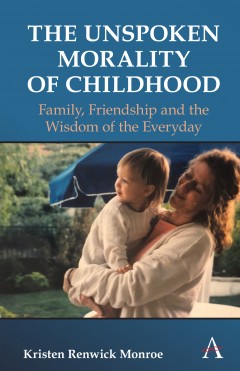The Unspoken Morality of Childhood
Family, Friendship, Self-Esteem and the Wisdom of the Everyday
By Kristen Renwick Monroe
Other Formats Available:
E-Book- About This Book
- Reviews
- Author Information
- Series
- Table of Contents
- Links
- Podcasts
About This Book
The Unspoken Morality of Childhood: Family, Friendship, Self-Esteem and the Wisdom of the Everyday reflects the thoughts of a senior ethicist. Each essay begins with a homey essay about the kind of everyday event that happens to everyone and then proceeds to discuss the ethical issues raised by such an event. The manuscript is interdisciplinary, located at the intersection of ethics, political psychology, moral psychology, philosophy, and political science/political theory. It uses stories to teach ethics and falls in the virtue ethics approach to ethics, making it perfect as a supplementary text for introductory courses to philosophy, moral psychology and political theory.
The manuscript discusses complex ethical concepts such as identity, agency, self-esteem, forgiveness, relations with our parents, dealing with loss, the moral imagination, and a wide range of other issues that people confront every day.
One of the essays, “Walnut”, tells a story about the author’s visiting her grandparents in a small, Midwestern town. This is turned into a discussion of the need for roots, how children formulate their sense of self, and how politicians like Donald Trump can turn the love of family and nostalgia for the past into a vicious tool in politics in which clever politicians exploit fears of foreigners and people who are “not like us.” Another essay describes a tired mother reading a piece of science fiction late at night, given to her by one of her children. A story by Olivia Butler asks why a black woman should be interested in science fiction and shows the value of the moral imagination, as science fiction reveals how those who can imagine alternate realities can then alert us to new possibilities, and better worlds. As Robert Kennedy was wont to ask: Some see the world as it is, and ask why. I imagine the world as it could be, and ask why not? The essay uses this prompt to discuss the importance of the moral imagination and the ability some have to conceptualize their way out of a dilemma that can plague others.
Reviews
"Kristen Monroe beautifully interweaves personal and intellectual autobiography, narrative and ethical theory in this highly readable and engaging collection. A prizewinning political scientist, a mother and a teacher of ethics, she shows vividly how the grand philosophical issues of ethics are experienced in the most practical and concrete areas of life."
Helen Haste, Visiting Professor of Education, Harvard Graduate School of Education, Harvard University, USA; Emeritus Professor of Psychology, The University of Bath, UK
"Kristen Monroe lives her values and they animate these writings with compassion and moral vision. Through these stories she shows us a way to support our children, learn from them and build a more caring world."
-Heather Booth, Social-Political Activist
"Kristen Monroe is a wise and generous person, who meets experiences with persistent humor and ever-increasing insight. The Unspoken Morality of Childhood reflects and refracts her fine scholarship, committed teaching and deep interdisciplinarity. As did I, each reader will find a particular resonance in one or another chapter.
-Jennifer Hochschild, Henry LaBarre Jayne Professor of Government and Professor of African and African American Studies, Harvard University, USA; Past President of the American Political Science Association
Author Information
Series
Table of Contents
Acknowledgments: From Babysitters to Elephants and John Stuart Mill’s Maxims for Children; Preface: We Tell Ourselves Stories in Order to Live; Introduction: The Moral of the Story; Chapter 1. Walnut; Chapter 2. J. O.; Chapter 3. Forgiveness and the Thin Red Line; Chapter 4. “I Got Nothing!”; Chapter 5. “It’s an Important Political Problem. I Should Know About It.” Agency; Chapter 6. Nicole’s Father Is Not German!; Chapter 7. Science Fiction Fantasy, Moral Imagination and the Ability to Conceptualize Your Way Out of a Problem; Chapter 8. Passion; Chapter 9. Cat; Chapter 10. Best Friends Forever; Chapter 11. Wretched, Slacker Disney Child; Chapter 12. The Last Lecture.
Links
Stay Updated
Information
Latest Tweets



